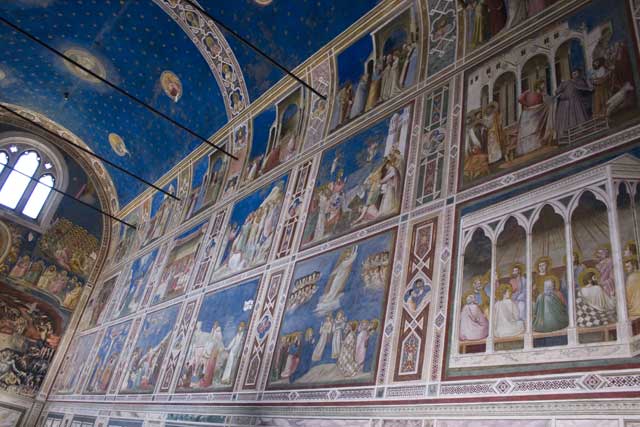On The Road: Dante and Giotto - soaking up Veneto's cultural heritage
Shona Main in Padua

In conservative Veneto, Padua is the nearest you'll get to a progressive city. A draw to the likes of Dante, Petrarch and Galileo, whose ideas were before their time, it was also the region's radical hotspot during the pre-unification Risorgimento and, latterly, the anti-fascist Resistenza.
I start at Caffè Pedrocchi, where the ringleaders of both movements met. Sitting outside, next to a marble lion, I can't help but come over all dangerous. I order a caffè corretto – an espresso "corrected" with a slug of grappa – even though it's still only 10am.
Padua's must-sees include Goethe's palm in the Orto Botanico; the charming thaumatropes of the Museo del Pre Cinema; the Palazzo della Ragione and its salsicce-filled market below; and the vaulted loggias of L'universita, encrusted with the heraldry of it alumni. However, the city's marvels, even for unbelievers, are Giotto's frescos in the Cappella degli Scrovegni.
The chapel was built in 1305 by a guilt-ridden banker, Enrico degli Scrovegni, who sought atonement for his sins and those of his father, Rinaldo. Dante Alighieri, someone you wouldn't have wanted to cross, knew Rinaldo and threw him into the seventh circle of his Inferno. It is here that usurers sit on smouldering sands as fiery embers rain down upon them.
I spend 15 minutes in a decontamination chamber – where visitors' hot, moist bodies are cooled and dehumidified by a strange, ticking machine – then I enter. A star-studded azure ceiling gives the chapel a dreamy, dusk-like feel. On both sides of the nave are three long rows, depicting the lives of the Virgin Mary and Jesus. They are strangely stirring. Giotto used vivid colour and an early form of perspective. Gone are the flat, stylised faces (even if the Byzantine halos remain) and instead there's realism, facial expressions and feeling.
Scrovegni may have flung his money at the Church in the hope he might buy his way out of the bad fire but at least he had a conscience. If only our bankers were as bothered by their sins. Oh, what riches we'd have.
'Footprint Venice & Veneto' is available now (£13.99)
Join our commenting forum
Join thought-provoking conversations, follow other Independent readers and see their replies
Comments